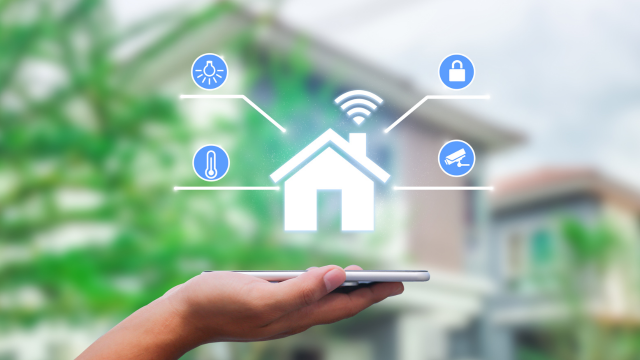The 23rd World Insights
Exploring the untold stories and events from around the globe.
Smart Homes: Where Wi-Fi Meets Home Sweet Home
Discover how smart homes transform your living space with seamless Wi-Fi connectivity. Make your home sweeter and smarter today!
The Benefits of Transitioning to a Smart Home: A Comprehensive Guide
Transitioning to a smart home offers a myriad of benefits that enhance daily living while increasing the overall value of your property. One of the most significant advantages is improved energy efficiency. With smart devices like thermostats, lights, and appliances, homeowners can monitor and control their energy usage remotely, leading to substantial savings on monthly utility bills. According to the U.S. Department of Energy, implementing smart technology can reduce energy consumption by up to 30%.
In addition to energy efficiency, smart home technology significantly boosts security. Homeowners can remotely access security cameras, receive alerts, and even control locks through their smartphones, providing peace of mind whether they're at home or away. A report from Statista indicates that 57% of smart home users have increased their sense of security after installing smart gadgets, underscoring the importance of these systems in today's modern living landscape.

How to Choose the Right Smart Home Devices for Your Lifestyle
Choosing the right smart home devices for your lifestyle involves understanding your specific needs and preferences. Start by evaluating which areas of your home you want to automate—be it security, convenience, energy efficiency, or entertainment. For instance, if you’re frequently away from home, investing in smart security cameras or a video doorbell like those found on Arlo might be ideal. Additionally, consider how these devices integrate with your existing systems; platforms like SmartThings can centralize control and enhance compatibility among various devices.
Next, assess the smart home devices that promote energy efficiency, such as smart thermostats or smart lighting systems. These devices can help reduce your energy bills while contributing to a more sustainable lifestyle. Brands like Ecobee offer smart thermostats with advanced features such as remote sensors and energy reports. Lastly, prioritize user-friendliness; ensure the devices you choose are easy to set up and operate. Reading reviews and testimonials from platforms like CNET can offer insights into which devices best suit your lifestyle.
Is Home Automation Worth It? Common Myths and Realities Explained
Home automation has become a popular topic in recent years, but with its rise, numerous myths and misconceptions have emerged. Many people wonder, is home automation worth it? One common myth is that home automation systems are overly complicated and only suitable for tech enthusiasts. In reality, advancements in technology have made these systems more user-friendly than ever. Brands like Samsung SmartThings and Nest have simplified the integration of smart devices, making it accessible for everyone. As a result, homeowners are enjoying enhanced convenience and energy efficiency without needing extensive tech knowledge.
Another prevalent myth is that home automation is an unnecessary luxury, focusing solely on convenience rather than practicality. However, the reality is that smart home technology can significantly contribute to a sustainable lifestyle and increased security. For instance, smart thermostats can reduce energy consumption and save you money on utility bills, while smart security systems provide peace of mind by allowing remote monitoring of your property. Studies show that homes with automated features tend to sell at higher prices, indicating that the market values these enhancements. For more information on the financial benefits, check out this article on Forbes.